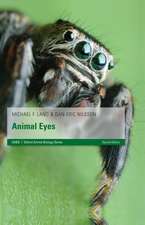Myelinated Fibers and Saltatory Conduction in the Shrimp: The Fastest Impulse Conduction in the Animal Kingdom
Autor Ke Xu, Susumu Terakawaen Limba Engleză Paperback – 23 aug 2016
| Toate formatele și edițiile | Preț | Express |
|---|---|---|
| Paperback (1) | 632.22 lei 6-8 săpt. | |
| Springer – 23 aug 2016 | 632.22 lei 6-8 săpt. | |
| Hardback (1) | 638.43 lei 6-8 săpt. | |
| Springer – 29 oct 2013 | 638.43 lei 6-8 săpt. |
Preț: 632.22 lei
Preț vechi: 743.79 lei
-15% Nou
Puncte Express: 948
Preț estimativ în valută:
120.99€ • 124.99$ • 100.69£
120.99€ • 124.99$ • 100.69£
Carte tipărită la comandă
Livrare economică 25 martie-08 aprilie
Preluare comenzi: 021 569.72.76
Specificații
ISBN-13: 9784431561071
ISBN-10: 4431561072
Pagini: 110
Ilustrații: XVIII, 110 p. 50 illus., 47 illus. in color.
Dimensiuni: 155 x 235 x 7 mm
Greutate: 0.19 kg
Ediția:Softcover reprint of the original 1st ed. 2013
Editura: Springer
Colecția Springer
Locul publicării:Tokyo, Japan
ISBN-10: 4431561072
Pagini: 110
Ilustrații: XVIII, 110 p. 50 illus., 47 illus. in color.
Dimensiuni: 155 x 235 x 7 mm
Greutate: 0.19 kg
Ediția:Softcover reprint of the original 1st ed. 2013
Editura: Springer
Colecția Springer
Locul publicării:Tokyo, Japan
Cuprins
I. Introduction.-II. Penaeus Shrimp as an Experimental Marine Animal for Neurobiological Study.-III. Morphological Studies on the Myelin Sheath of Nerve Fibers.-IV. Biochemical study on myelin of nervous system.-V. Myelin Sheath with a New Type of Fine Structure Found in the Nervous System of the Penaeus Shrimp, the Invertebrates.-VI. Two Unique Structures Discovered in the Myelinated Fibers of the Penaeus Shrimp.-VII. Studies on Impulse Conduction of Nerve Fibers .-VIII. Saltatory Conduction Found in the Nervous System of Invertebrates, Shrimp (Penaeus) and the Earthworm (Lumbricus terrestries).-IX. Experimental Confirmation of Saltatory Conduction Hypothesis.-X. Three Mechanisms or Strategies for Increasing Conduction Velocity of Nerve Fibers.-XI. Ultra-High Conduction Velocity Found in the Medial Giant Fiber of Penaeus chinensis and Penaeus japonicas.-XII. Remarks on Evolution of Myelin Sheath, Glial Cells, Nodal Structures and Conduction Function of Nerve Fibers.
Textul de pe ultima copertă
In 1961, neurobiologists found that the conduction velocity of the nerve impulse in the giant nerve fiber of the Penaeus shrimp abdominal nerve cord was over 200 m/s, the highest speed of information transmission ever observed in the animal kingdom. The peculiar myelin sheath with its unique nodal structure and the electrical properties of the nerve fibers of the shrimp have continued to be investigated for a quarter of century and are now fully described in this book. The investigation dispels the commonly held belief that the fastest recorded impulse conduction is about 120 m/s in the thickest vertebrate myelinated nerve fibers. In the shrimp, researchers found a completely novel type of functional node in the giant fiber which they designated as the fenestration node. In portions of the myelinated fiber, the fenestration node furnished the sites of excitation. Also discovered was a new strategy for increasing impulse conduction in the shrimp. The book includes a section on the formation of the fenestration node and the discovery of a strategy that allows the shrimp to escape its predators by an action of the fastest velocity. The data presented in this volume on the myelin sheath of invertebrates present a new direction for this field and a rich source of information for neurobiologists worldwide.
Caracteristici
Unveils the mysterious structure of nerve fibers of the shrimp Demonstrates the uniqueness of shrimp nerve fibers with fastest conduction velocity in the animal kingdom Compares distant branches of the evolutionary tree with different morphogenesis but similar outcome

















